Cop day 5 live: Indigenous activists blockade the summit centre as climate conference continues
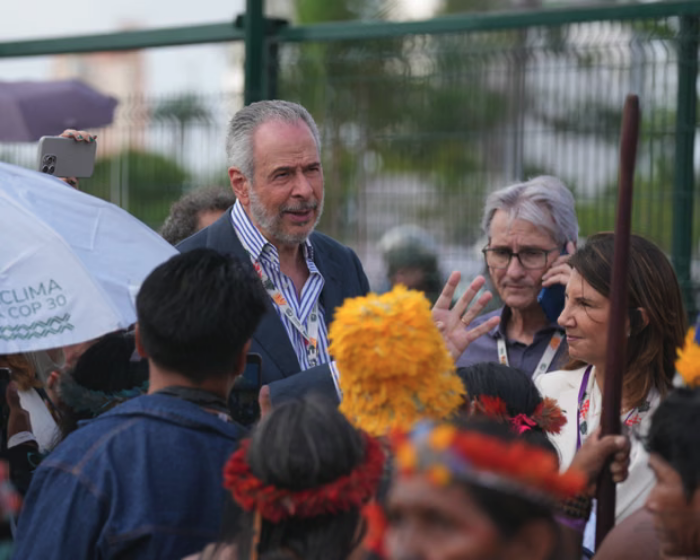
By Guardian - Oliver Milman - 14 November 2025
As the climate conference goes into its fifth day, with huge amounts still unresolved, there were reports that activists had blockaded the entrance to the centre.
The Guardian’s expert news coverage is funded by people like you, not a billionaire owner. Readers who choose an All-access digital subscription make the most impact and enjoy great benefits in return. Will you join them today?

Oliver Milman
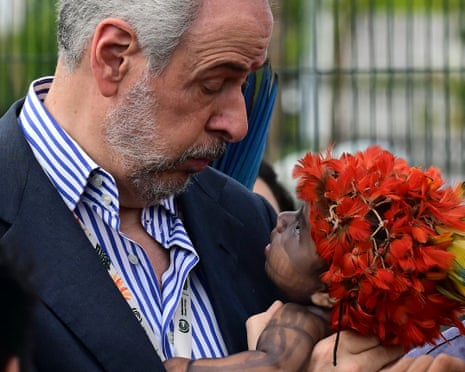
My colleague Oliver Milman has just filed this report on this morning’s blockade of Cop30.
Protesters demanding to speak to Brazil’s president about the plight of the country’s indigenous peoples blockaded the main entrance to the Cop30 venue here in Belem for several hours, eventually leading to an extraordinary meeting with André Corrêa do Lago, the summit’s chief.
A group of around 50 people from the Munduruku, an indigenous people in the Amazon basin, blocked the entrance with some assistance from international green groups. Behind them was a huge phalanx of riot police with shields, soldiers and military vehicles.
A huge swell of delegates and journalists jostled, sometimes aggressively, around the Munduruku as they sang and chanted, some holding babies or bows and arrows. They brandished signs reading ‘Munduruku indigenous territory is sacred. Enough of the invasion and disrespect’ and ‘No to predatory tourism in the territory of the Munduruku people.’
The group demanded to speak to Luiz Inácio Lula da Silva but instead had to settle for do Lago, the tall, amiable Cop president who spent over an hour listening and occasionally talking to the group’s representatives. At one point do Lago held one of the babies.
“We demand the presence of president Lula, but unfortunately we are unable to do so, as always,” said one of the protestors. “We were always barred, we were never listened to. Enterprise is being brought without our ears. Every type of venture is being invested without listening to us.”
Several protesters said that they were unhappy about their rivers being essentially privatized for commerce by Brazil’s government, a move they see as a threat to their way of life. Others mentioned they were being subjected to deforestation. mining and fish being killed by mercury poisoning.
“It’s not a negotiation meeting,” said one protester who spoke to the crowd. “We don’t negotiate the lives of our children, no. Ours was Munduruku. So we’re here to demand and we’re here to fight and know.”
She continued to say that “Brazil has a Constitution that does not respect the population” and that the privatization of rivers is “violating the right to our life, our culture and the way of life of the peoples.” She called the river “our lady” and said that “she is life, she is sacred. Nobody’s going to believe it here, bro. Nobody here is going to negotiate mining or work on our land.”
do Lago then held the hands of two of the protestors and led the entire group through a scrum of onlookers, some having to be pushed aside by the Munduruku so they could get past.
Amid the rather sweaty melee, I was able to get alongside a rather overwhelmed-looking do Lago and asked him what he had told the group. He just said “Yes, yes. I want to help, I want to help.”
The Cop president then led the entire Munduruku group to a building separate from the Cop venue, likely a presidential office, that sits behind a tall, secure gate. We will have to wait for the outcome of his talks with the group.
The venue has now reopened, albeit with a mass of people waiting in long lines to get in. A UN spokesman called the blockade a “peaceful demonstration” and that people should expect longer wait times. The incident comes after Simon Stiell, the UN’s climate chief, reportedly raised concerns with the Brazilian hosts about security, as well as air conditioning and the state of delegate offices, at Cop30.

Damian Carrington
Norway and the United Arab Emirates - both significant fossil fuel producers - are among the ministerial pairings announced by the Brazilian Cop30 Presidency. The task of the pairings is to consult with countries on specific issues and report their views back to the presidency, to help the negotiations progress.
The ministers from Norway and the UAE will work on the “global stocktake”, the strand of the talks about the big gap between the carbon emissions cuts needed and the real world. At its heart is cutting fossil fuel emissions, which makes it a target for obstruction by petrostates. The UAE hosted Cop28 in 2023, which delivered the first ever mention of fossil fuels in a Cop outcome.
The pairings match a developing country with a developed one and also include the UK and Kenya, who will work on finance, a critical issue underpinning the whole UN climate process.
The UK has been a significant climate donor but declined to contribute to the Tropical Forests Forever Facility launched by Brazil at Cop30. Kenya is a prime mover behind the Global Solidarity Levies Task Force, which is promoting ideas to raise climate funds including taxes on flights and financial transactions.
The other pairings are:
- Gambia and Germany, working on adaptation
- Egypt and Spain, working on mitigation, i.e. cutting emissions
- Mexico and Poland, working on just transition, i.e. making the switch to a clean economy fair
- Australia and India, working on clean technology transfer from rich to poor countries
- Chile and Sweden, working on gender, i.e. ensuring climate action addresses gender inequality and empowers women

Damian Carrington
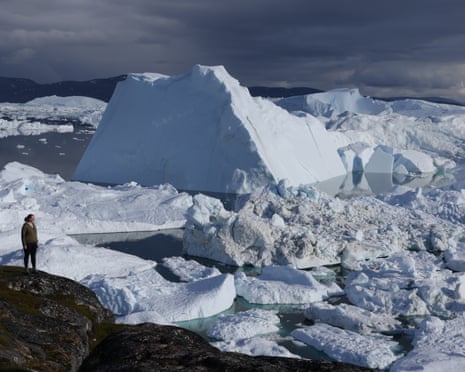
“We cannot negotiate with the melting point of ice.” That is the striking message on the cover of a report from the International Cryosphere Climate Initiative (ICCI), launched at Cop30 on Thursday evening.
The melting of the ice sheets, glaciers and permafrost that make up the planet’s cryosphere is already vast - 30 million tonnes an hour from Greenland alone. It leads to the most profound long-term impact of the climate crisis: sea level rise that will drown cities and towns that sit on the world’s coastlines.
Pam Pearson, ICCI director, is blunt: “The damage to coastal and downstream communities is already tragic, but only the beginning. A child born today and living 2-3 metres above sea-level will almost certainly lose their home within their lifetime if current emissions continue. Within the lifetimes of their own great-great grand-children – by 2300 – that might rise to 15 metres if we do not course-correct by phasing out fossil fuels.”
“Either global leaders and the public still do not understand the scale of threat from cryosphere loss, or have become resigned to such global destruction,” she says. António Guterres, UN secretary general has warned that rising seas threaten “a mass exodus of entire populations on a biblical scale”.
The report says that global temperature rise will have to be returned to 1C next century to slow ice melting and sea-level rise to rates that allow feasible adaptation and minimise the damage.
“There are feasible pathways that address the root fossil-fuel causes of global warming, and halt the current global insanity that would lock in thousands of years of human suffering and species loss” the report says.
“All involve the phase out of fossil fuel use: first of coal (2040s), then gas (2050s), then oil (2060s),” the report says. “After that, feasible methods of carbon dioxide removal [from the atmosphere] can bring down temperatures to as low as 1.2°C – lower than today’s temperatures. By 2150, we can be below the 1C mark that major findings published this year indicate as the true safe planetary boundary for both ice sheets and mountain glaciers.”

Fiona Harvey
Back inside the conference my colleague Fiona Harvey has this on the state of the negotiations.
In a sign of how tough the negotiations are on the four issues on which the presidency is taking special consultation, the official negotiating hours were extended on Thursday night to 9pm in Belem, with a similar extension due for Friday night.
In practice, talks could go on much later on Friday as Brazil strives to achieve progress in the consultations ahead of a stocktake session on Saturday, at which the presidency is supposed to have resolved the question of how to proceed on each of the four thorny issues.
The four are: finance, and the interpretation of Article 9.1 of the Paris agreement which requires developed countries to provide climate finance to the poor world; trade, in particular “unilateral trade measures”, such as the EU’s green tariffs; transparency, focusing on the biennial transparency reports that must be filed by all parties under the Paris agreement; and the key question of how to deal with the fact that the current crop of nationally determined contributions (NDCs), which set out how far and how fast countries will cut their greenhouse gas emissions, are inadequate to stay within the 1.5C global heating threshold set out at Paris.
Parties must decided on how to adopt these matters into formal agenda items and move forward with them, or drop them.
On the plus side, however, as Brazil hived these difficult questions into separate consultations, the negotiations on the rest of the agenda can proceed - if delegates are able to make their meetings on time, as the protests outside have disrupted entry.

Fiona Harvey
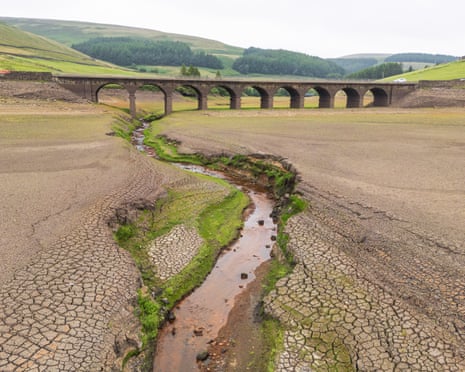
Disasters such as droughts, floods and the spread of pests have cost the world more than $3 trillion in losses to agriculture over the past three decades, much of it worsened by the climate crisis, new research has found.
Nearly 5bn tonnes of cereals, about 3bn tonnes of fruit and vegetables, and close to 1 billion tonnes of meat and dairy produce were destroyed in total by disasters between 1991 and 2023, according to the Food and Agriculture Organisation of the UN.
Nearly $100bn a year was lost, which was about 4% of global GDP from the agriculture sector over the period, according to the report entitled The Impact of Disasters on Agriculture and Food Security 2025.
Nearly half of the losses afflicted Asia, amounting to about $1.5 trillion in damage. The Americas accounted for about a fifth of the global share, more than $700bn. Africa suffered less in terms of the value of its products – about $700bn in total over the period – but this was the highest proportionally to the size of its economy, resulting in a loss of more than 7% to the continent’s GDP.
The FAO report found: “In economies where agriculture accounts for a significant share of employment and income, these losses have had severe consequences for food security and rural stability.”
Marine heatwaves, which have been intensified by the climate crisis, have also damaged fisheries: about 15% of global fisheries have been affected, with $6.6bn in losses between 1985 and 2022.
Qu Dongyu, director general of the FAO, wrote in the foreword: “The findings presented here call for urgent action from all stakeholders. Governments must integrate disaster risk reduction into agricultural policies and investments. The private sector must engage in partnerships that ensure equitable access to digital innovations. Development partners must shift resources from emergency response to anticipatory action and resilience-building. And the international community must recognise that investing in agricultural resilience is not a cost but a foundation for sustainable development, peace and prosperity.”

Damien Gayle
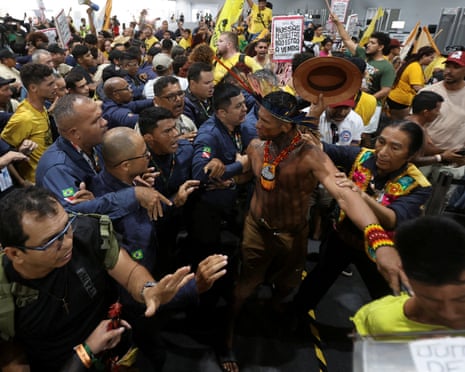
Simon Stiell, the UN climate chief, has written a letter to Brazilian authorities outlining “urgent concerns” about security lapses, high temperatures and flooding at the Cop30 conference venue.
Stiell complained that the Brazilian authorities had failed to respond properly to protesters who tried to force their way in to the summit on Tuesday evening, as well as to other protesters inside restricted areas on Wednesday morning.
And he compiled a list of infrastructure problems that have affected the venue, in the Amazonian city of Belém, including inadequate air conditioning, leaks around electrical fixtures, water shortages in bathrooms and long lines for food.
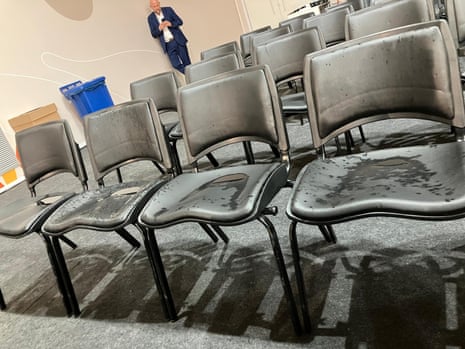
The three-page letter addressed to Cop30 president André Corrêa do Lago, which was first reported by Bloomberg and subsequently confirmed by Brazilian media, was sent on Wednesday, the day after about 150 indigenous community members and their supporters tried to force their way into the summit venue.
“The security forces and command structure required to execute the security plan were all present on the ground during the incident but failed to act,” Stiell was quoted as saying.
“This represents a serious breach of the established security framework” and raises “significant concerns” about whether Brazil is complying with its security obligations, he added, according to Bloomberg.
Stiell also complained that there had been “serious concern regarding the poor condition of delegation offices”, and other parts of the conference venue. High temperatures had already led to “heat-related health concerns”, while leaks around light fixtures posed “potential safety hazards”
Updated at 12.49 GMT2h ago12.20 GMT
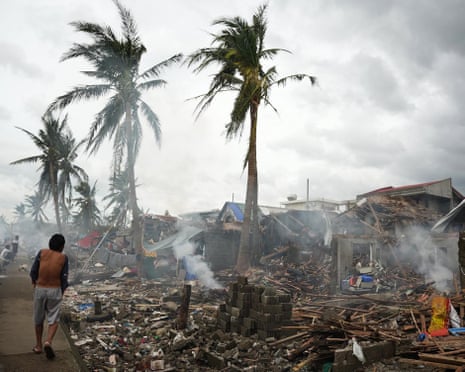
Nothing shows the urgency of fighting the climate crisis more dramatically than the harm human-caused global heating is already wreaking on people and places, writes Guardian environment editor Damian Carrington.
Today brings the latest example, with the news that the direct economic damage caused recently in the Philippines by Super Typhoon Fung-wong was increased by about 40%, because of the CO2 pumped into the atmosphere by burning fossil fuels. That’s homes, businesses, hospitals, roads and more, all hit much harder because of climate change.
The estimate, made by researchers at Imperial College London, used a method called attribution. This involves comparing the actual intensity of the typhoon today, with a modelled typhoon in a world without global heating - more details here.
With fossil fuel emissions setting a new record in 2025, typhoons will become even more destructive. In a world with 2C of global heating, the economic damage would be 62% higher than an unheated world, the scientists found.
The study also found that human-induced warming of the climate intensified Fung-wong’s rainfall by 10.5% and strengthened its wind speed by 5%. The climate crisis also intensified Typhoon Kalmaegi, which also struck the Phillipines, where it killed at least 224 people.
“Our studies capture only a partial view of the far-reaching human and economic costs caused by Typhoons Kalmaegi and Fung-wong,” said Dr Emily Theokritoff at Imperial College. The analysis does not, for example, include the long-term harm to health.
“As Cop30 unfolds, this serves as a powerful reminder of the urgent economic case for cutting emissions now, and the moral responsibility to rapidly scale up international finance for loss and damage and adaptation in vulnerable countries,” she said.
The climate crisis is already causing many searing heatwaves that would have been impossible without fossil fuel emissions, and heat is killing about one person per minute on average. Attribution studies are also increasingly relevant in lawsuits aiming to hold polluters to account. Carbon emissions from the world’s biggest fossil fuel companies were directly linked to dozens of deadly heatwaves for the first time in September.
Dharna Noor
Today, the international youth climate group Fridays for Future are holding a global climate strike in cities across the world. I met the organizers of the march in Belém early this morning by the city’s port as they prepared for the strike.
Among the first to arrive: Sueley Cavalcante, a 26-year-old Fridays for Future organizer and art history student. She came to Cop from Sao Paolo, Brazil.
“We have to face a lot of contractions at this Cop,” she told me. The biggest one, she said, is the exploitation of resources taking place to make the conference happen.
“Brazil wants to be considered a global climate leader but they just do this to show off. It’s just discourse,” she said. “They cannot do that while opening new oil exploration. For us, doing this Cop in the most sensitive zone in the Atlantic is even worse.” Read more about those concerns here.
Officials say the oil exploration will create jobs for families who need them, but oil jobs require a lot of technical expertise and experience, Cavalcante told me. “The oil is not going to help those families,” she said.
Fridays for Future is the “first contact” many young Brazilians have with activism, said Cavalcante.
“Fridays for Future is an invitation for young [people] to discover themselves, to discover that if they care about climate there are so many ways for them to get involved.”
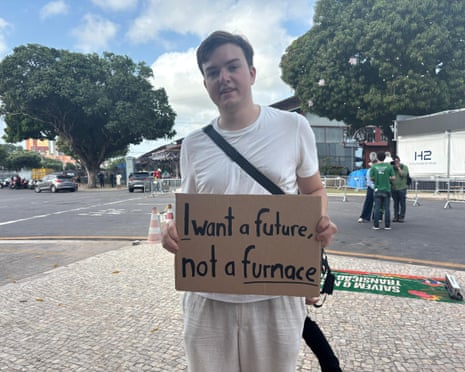
Luca Ernemann from German youth climate organization Nature and Biodiversity Conservation Union has come to the youth strike to pressure governments to do more on climate.
“Cops happen, but emissions go up. Our governments have to make real solutions and have more ambitions especially on the NDCs,” he said. (That’s Cop-talk for “nationally determined contributions, or countries’ plans to curb carbon pollution.”)
Some more pictures of this morning’s protests are coming through. And my colleague Oliver Milman has arrived at the scene and says Cop president Andre Correa do Lago is now talking to the protesters.
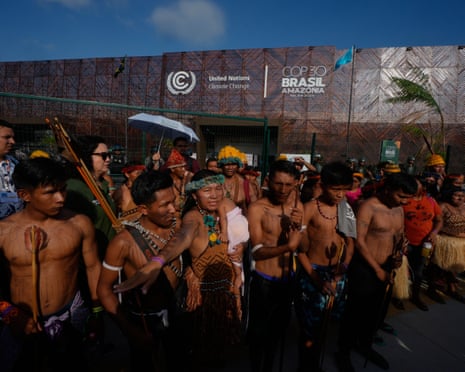
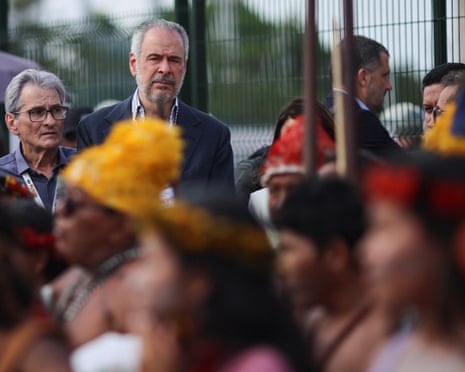
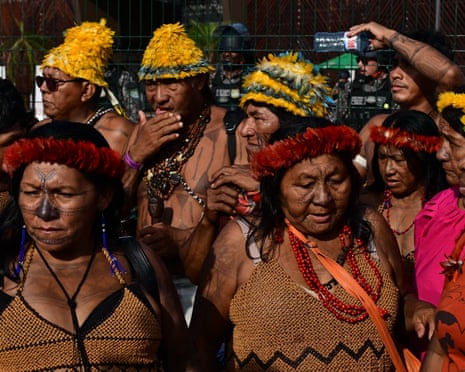
My colleague Dharna Noor has this update on the day ahead.
Negotiations at Cop30 are moving along, but it has become clear which issues will become major sticking points. Among those problems: trade, transparency regarding emissions reporting and finance, and the need for countries to regularly submit action plans (known in Cop-talk as “nationally determined contributions”) to draw down planet-heating pollution. We’re hoping to have an update on these challenges on Saturday from Brazilian officials.
Parties are also working through disagreements on finance for adaptation to the climate crisis. But Cop is not merely about politicians’ negotiations. This year, the conference has also sparked a colorful array of events held by civil society groups. “That’s where it’s really all happening,” Susana Muhamad, former environment minister for Colombia, told my colleague Jon Watts and I on Wednesday evening.
Friday will bring the continuation of the people’s summit, where movements from around the world are holding events focused on promoting climate justice. There, the programming, put together by 1,100 organizations, is focused on themes such as land and food sovereignty, environmental racism, the need for climate policy to uplift workers, the preservation of democracy, sustainable and just development, and gender equity.
Meanwhile, youth in Belem and around the world will hold a climate strike demanding the swift and justice-oriented phaseout of fossil fuels. Follow the blog to see our coverage!
The issues being raised during Cop, both inside and outside the negotiations, may seem too vast to grasp. But remember: the climate crisis is reshaping every facet of society. The UN’s top climate science body told us back in 2019 that averting climate catastrophe will require “unprecedented changes across all aspects of society”.
In other news: If you’ve been following the drama over which country will host Cop31, know that Australia and Turkey are still butting heads. We’ll keep you posted!
Good morning Matthew Taylor here and I will be hosting the liveblog for the next few hours.
We are getting reports from Belem that dozens of Indigenous protesters are blocking the front of the COP30 summit venue demanding that the Brazilian government halt all development projects in the Amazon, including mining, logging, oil drilling and the building of a new railway for transporting mining and agricultural products..
The protesters staged a sit-in creating long queues and forcing delegates to use a side entrance to resume their negotiations on tackling climate change.
Colleagues are on their way to the protests and we will should have more information soon.
Explore more on these topics
Reuse this contentCOP30 President Andre Correa do Lago holds a Munduruku Indigenous toddler during a blockade of the conference on Friday. Photograph: Pablo Porciúncula/AFP/Getty Images
My colleague Oliver Milman has just filed this report on this morning’s blockade of Cop30.
Protesters demanding to speak to Brazil’s president about the plight of the country’s indigenous peoples blockaded the main entrance to the Cop30 venue here in Belem for several hours, eventually leading to an extraordinary meeting with André Corrêa do Lago, the summit’s chief.
A group of around 50 people from the Munduruku, an indigenous people in the Amazon basin, blocked the entrance with some assistance from international green groups. Behind them was a huge phalanx of riot police with shields, soldiers and military vehicles.
A huge swell of delegates and journalists jostled, sometimes aggressively, around the Munduruku as they sang and chanted, some holding babies or bows and arrows. They brandished signs reading ‘Munduruku indigenous territory is sacred. Enough of the invasion and disrespect’ and ‘No to predatory tourism in the territory of the Munduruku people.’
The group demanded to speak to Luiz Inácio Lula da Silva but instead had to settle for do Lago, the tall, amiable Cop president who spent over an hour listening and occasionally talking to the group’s representatives. At one point do Lago held one of the babies.
“We demand the presence of president Lula, but unfortunately we are unable to do so, as always,” said one of the protestors. “We were always barred, we were never listened to. Enterprise is being brought without our ears. Every type of venture is being invested without listening to us.”
Several protesters said that they were unhappy about their rivers being essentially privatized for commerce by Brazil’s government, a move they see as a threat to their way of life. Others mentioned they were being subjected to deforestation. mining and fish being killed by mercury poisoning.
“It’s not a negotiation meeting,” said one protester who spoke to the crowd. “We don’t negotiate the lives of our children, no. Ours was Munduruku. So we’re here to demand and we’re here to fight and know.”
She continued to say that “Brazil has a Constitution that does not respect the population” and that the privatization of rivers is “violating the right to our life, our culture and the way of life of the peoples.” She called the river “our lady” and said that “she is life, she is sacred. Nobody’s going to believe it here, bro. Nobody here is going to negotiate mining or work on our land.”
do Lago then held the hands of two of the protestors and led the entire group through a scrum of onlookers, some having to be pushed aside by the Munduruku so they could get past.
Amid the rather sweaty melee, I was able to get alongside a rather overwhelmed-looking do Lago and asked him what he had told the group. He just said “Yes, yes. I want to help, I want to help.”
The Cop president then led the entire Munduruku group to a building separate from the Cop venue, likely a presidential office, that sits behind a tall, secure gate. We will have to wait for the outcome of his talks with the group.
The venue has now reopened, albeit with a mass of people waiting in long lines to get in. A UN spokesman called the blockade a “peaceful demonstration” and that people should expect longer wait times. The incident comes after Simon Stiell, the UN’s climate chief, reportedly raised concerns with the Brazilian hosts about security, as well as air conditioning and the state of delegate offices, at Cop30.

Damian Carrington
Norway and the United Arab Emirates - both significant fossil fuel producers - are among the ministerial pairings announced by the Brazilian Cop30 Presidency. The task of the pairings is to consult with countries on specific issues and report their views back to the presidency, to help the negotiations progress.
The ministers from Norway and the UAE will work on the “global stocktake”, the strand of the talks about the big gap between the carbon emissions cuts needed and the real world. At its heart is cutting fossil fuel emissions, which makes it a target for obstruction by petrostates. The UAE hosted Cop28 in 2023, which delivered the first ever mention of fossil fuels in a Cop outcome.
The pairings match a developing country with a developed one and also include the UK and Kenya, who will work on finance, a critical issue underpinning the whole UN climate process.
The UK has been a significant climate donor but declined to contribute to the Tropical Forests Forever Facility launched by Brazil at Cop30. Kenya is a prime mover behind the Global Solidarity Levies Task Force, which is promoting ideas to raise climate funds including taxes on flights and financial transactions.
The other pairings are:
- Gambia and Germany, working on adaptation
- Egypt and Spain, working on mitigation, i.e. cutting emissions
- Mexico and Poland, working on just transition, i.e. making the switch to a clean economy fair
- Australia and India, working on clean technology transfer from rich to poor countries
- Chile and Sweden, working on gender, i.e. ensuring climate action addresses gender inequality and empowers women

Damian Carrington

Melting of the the Greenland ice sheet is intensifying because of the continued burning of fossil fuels Photograph: Sean Gallup/Getty Images
“We cannot negotiate with the melting point of ice.” That is the striking message on the cover of a report from the International Cryosphere Climate Initiative (ICCI), launched at Cop30 on Thursday evening.
The melting of the ice sheets, glaciers and permafrost that make up the planet’s cryosphere is already vast - 30 million tonnes an hour from Greenland alone. It leads to the most profound long-term impact of the climate crisis: sea level rise that will drown cities and towns that sit on the world’s coastlines.
Pam Pearson, ICCI director, is blunt: “The damage to coastal and downstream communities is already tragic, but only the beginning. A child born today and living 2-3 metres above sea-level will almost certainly lose their home within their lifetime if current emissions continue. Within the lifetimes of their own great-great grand-children – by 2300 – that might rise to 15 metres if we do not course-correct by phasing out fossil fuels.”
“Either global leaders and the public still do not understand the scale of threat from cryosphere loss, or have become resigned to such global destruction,” she says. António Guterres, UN secretary general has warned that rising seas threaten “a mass exodus of entire populations on a biblical scale”.
The report says that global temperature rise will have to be returned to 1C next century to slow ice melting and sea-level rise to rates that allow feasible adaptation and minimise the damage.
“There are feasible pathways that address the root fossil-fuel causes of global warming, and halt the current global insanity that would lock in thousands of years of human suffering and species loss” the report says.
“All involve the phase out of fossil fuel use: first of coal (2040s), then gas (2050s), then oil (2060s),” the report says. “After that, feasible methods of carbon dioxide removal [from the atmosphere] can bring down temperatures to as low as 1.2°C – lower than today’s temperatures. By 2150, we can be below the 1C mark that major findings published this year indicate as the true safe planetary boundary for both ice sheets and mountain glaciers.”

Fiona Harvey
Back inside the conference my colleague Fiona Harvey has this on the state of the negotiations.
In a sign of how tough the negotiations are on the four issues on which the presidency is taking special consultation, the official negotiating hours were extended on Thursday night to 9pm in Belem, with a similar extension due for Friday night.
In practice, talks could go on much later on Friday as Brazil strives to achieve progress in the consultations ahead of a stocktake session on Saturday, at which the presidency is supposed to have resolved the question of how to proceed on each of the four thorny issues.
The four are: finance, and the interpretation of Article 9.1 of the Paris agreement which requires developed countries to provide climate finance to the poor world; trade, in particular “unilateral trade measures”, such as the EU’s green tariffs; transparency, focusing on the biennial transparency reports that must be filed by all parties under the Paris agreement; and the key question of how to deal with the fact that the current crop of nationally determined contributions (NDCs), which set out how far and how fast countries will cut their greenhouse gas emissions, are inadequate to stay within the 1.5C global heating threshold set out at Paris.
Parties must decided on how to adopt these matters into formal agenda items and move forward with them, or drop them.
On the plus side, however, as Brazil hived these difficult questions into separate consultations, the negotiations on the rest of the agenda can proceed - if delegates are able to make their meetings on time, as the protests outside have disrupted entry.

Fiona Harvey

Very low water levels at Woodhead Reservoir in Longdendale, UK which has had its driest start to the year since 1976 Photograph: Bloomberg/Getty Images
Disasters such as droughts, floods and the spread of pests have cost the world more than $3 trillion in losses to agriculture over the past three decades, much of it worsened by the climate crisis, new research has found.
Nearly 5bn tonnes of cereals, about 3bn tonnes of fruit and vegetables, and close to 1 billion tonnes of meat and dairy produce were destroyed in total by disasters between 1991 and 2023, according to the Food and Agriculture Organisation of the UN.
Nearly $100bn a year was lost, which was about 4% of global GDP from the agriculture sector over the period, according to the report entitled The Impact of Disasters on Agriculture and Food Security 2025.
Nearly half of the losses afflicted Asia, amounting to about $1.5 trillion in damage. The Americas accounted for about a fifth of the global share, more than $700bn. Africa suffered less in terms of the value of its products – about $700bn in total over the period – but this was the highest proportionally to the size of its economy, resulting in a loss of more than 7% to the continent’s GDP.
The FAO report found: “In economies where agriculture accounts for a significant share of employment and income, these losses have had severe consequences for food security and rural stability.”
Marine heatwaves, which have been intensified by the climate crisis, have also damaged fisheries: about 15% of global fisheries have been affected, with $6.6bn in losses between 1985 and 2022.
Qu Dongyu, director general of the FAO, wrote in the foreword: “The findings presented here call for urgent action from all stakeholders. Governments must integrate disaster risk reduction into agricultural policies and investments. The private sector must engage in partnerships that ensure equitable access to digital innovations. Development partners must shift resources from emergency response to anticipatory action and resilience-building. And the international community must recognise that investing in agricultural resilience is not a cost but a foundation for sustainable development, peace and prosperity.”

Damien Gayle

Demonstrators force their way into the Cop30 venue in Belem on Tuesday evening Photograph: Anderson Coelho/Reuters
Simon Stiell, the UN climate chief, has written a letter to Brazilian authorities outlining “urgent concerns” about security lapses, high temperatures and flooding at the Cop30 conference venue.
Stiell complained that the Brazilian authorities had failed to respond properly to protesters who tried to force their way in to the summit on Tuesday evening, as well as to other protesters inside restricted areas on Wednesday morning.
And he compiled a list of infrastructure problems that have affected the venue, in the Amazonian city of Belém, including inadequate air conditioning, leaks around electrical fixtures, water shortages in bathrooms and long lines for food.

Spotted by a sharp-eyed Guardian reporter on day one; rain was coming through the centre’s roof and leaking into a meeting room. Photograph: Fiona Harvey/The Guardian
The three-page letter addressed to Cop30 president André Corrêa do Lago, which was first reported by Bloomberg and subsequently confirmed by Brazilian media, was sent on Wednesday, the day after about 150 indigenous community members and their supporters tried to force their way into the summit venue.
“The security forces and command structure required to execute the security plan were all present on the ground during the incident but failed to act,” Stiell was quoted as saying.
“This represents a serious breach of the established security framework” and raises “significant concerns” about whether Brazil is complying with its security obligations, he added, according to Bloomberg.
Stiell also complained that there had been “serious concern regarding the poor condition of delegation offices”, and other parts of the conference venue. High temperatures had already led to “heat-related health concerns”, while leaks around light fixtures posed “potential safety hazards”
Updated at 12.49 GMT2h ago12.20 GMT

A day after Super Typhoon Fung-wong made landfall in the Philippines Photograph: Charism Sayat/AFP/Getty Images
Nothing shows the urgency of fighting the climate crisis more dramatically than the harm human-caused global heating is already wreaking on people and places, writes Guardian environment editor Damian Carrington.
Today brings the latest example, with the news that the direct economic damage caused recently in the Philippines by Super Typhoon Fung-wong was increased by about 40%, because of the CO2 pumped into the atmosphere by burning fossil fuels. That’s homes, businesses, hospitals, roads and more, all hit much harder because of climate change.
The estimate, made by researchers at Imperial College London, used a method called attribution. This involves comparing the actual intensity of the typhoon today, with a modelled typhoon in a world without global heating - more details here.
With fossil fuel emissions setting a new record in 2025, typhoons will become even more destructive. In a world with 2C of global heating, the economic damage would be 62% higher than an unheated world, the scientists found.
The study also found that human-induced warming of the climate intensified Fung-wong’s rainfall by 10.5% and strengthened its wind speed by 5%. The climate crisis also intensified Typhoon Kalmaegi, which also struck the Phillipines, where it killed at least 224 people.
“Our studies capture only a partial view of the far-reaching human and economic costs caused by Typhoons Kalmaegi and Fung-wong,” said Dr Emily Theokritoff at Imperial College. The analysis does not, for example, include the long-term harm to health.
“As Cop30 unfolds, this serves as a powerful reminder of the urgent economic case for cutting emissions now, and the moral responsibility to rapidly scale up international finance for loss and damage and adaptation in vulnerable countries,” she said.
The climate crisis is already causing many searing heatwaves that would have been impossible without fossil fuel emissions, and heat is killing about one person per minute on average. Attribution studies are also increasingly relevant in lawsuits aiming to hold polluters to account. Carbon emissions from the world’s biggest fossil fuel companies were directly linked to dozens of deadly heatwaves for the first time in September.
Dharna Noor
Today, the international youth climate group Fridays for Future are holding a global climate strike in cities across the world. I met the organizers of the march in Belém early this morning by the city’s port as they prepared for the strike.
Among the first to arrive: Sueley Cavalcante, a 26-year-old Fridays for Future organizer and art history student. She came to Cop from Sao Paolo, Brazil.
“We have to face a lot of contractions at this Cop,” she told me. The biggest one, she said, is the exploitation of resources taking place to make the conference happen.
“Brazil wants to be considered a global climate leader but they just do this to show off. It’s just discourse,” she said. “They cannot do that while opening new oil exploration. For us, doing this Cop in the most sensitive zone in the Atlantic is even worse.” Read more about those concerns here.
Officials say the oil exploration will create jobs for families who need them, but oil jobs require a lot of technical expertise and experience, Cavalcante told me. “The oil is not going to help those families,” she said.
Fridays for Future is the “first contact” many young Brazilians have with activism, said Cavalcante.
“Fridays for Future is an invitation for young [people] to discover themselves, to discover that if they care about climate there are so many ways for them to get involved.”

Luca Ernemann a German youth climate protesters Photograph: Dharna Noor/The Guardian
Luca Ernemann from German youth climate organization Nature and Biodiversity Conservation Union has come to the youth strike to pressure governments to do more on climate.
“Cops happen, but emissions go up. Our governments have to make real solutions and have more ambitions especially on the NDCs,” he said. (That’s Cop-talk for “nationally determined contributions, or countries’ plans to curb carbon pollution.”)
Some more pictures of this morning’s protests are coming through. And my colleague Oliver Milman has arrived at the scene and says Cop president Andre Correa do Lago is now talking to the protesters.

Indigenous protesters blockade the entrance to COP30 in Belem, Brazil Photograph: Fernando Llano/AP

COP30 President Andre Correa do Lago meets indigenous people blocking access to the conference in Belem, Brazil Photograph: Adriano Machado/Reuters

Indigenous protesters blockade the entrance to COP30 in Belem, Brazil Photograph: Pablo Porciúncula/AFP/Getty Images
My colleague Dharna Noor has this update on the day ahead.
Negotiations at Cop30 are moving along, but it has become clear which issues will become major sticking points. Among those problems: trade, transparency regarding emissions reporting and finance, and the need for countries to regularly submit action plans (known in Cop-talk as “nationally determined contributions”) to draw down planet-heating pollution. We’re hoping to have an update on these challenges on Saturday from Brazilian officials.
Parties are also working through disagreements on finance for adaptation to the climate crisis. But Cop is not merely about politicians’ negotiations. This year, the conference has also sparked a colorful array of events held by civil society groups. “That’s where it’s really all happening,” Susana Muhamad, former environment minister for Colombia, told my colleague Jon Watts and I on Wednesday evening.
Friday will bring the continuation of the people’s summit, where movements from around the world are holding events focused on promoting climate justice. There, the programming, put together by 1,100 organizations, is focused on themes such as land and food sovereignty, environmental racism, the need for climate policy to uplift workers, the preservation of democracy, sustainable and just development, and gender equity.
Meanwhile, youth in Belem and around the world will hold a climate strike demanding the swift and justice-oriented phaseout of fossil fuels. Follow the blog to see our coverage!
The issues being raised during Cop, both inside and outside the negotiations, may seem too vast to grasp. But remember: the climate crisis is reshaping every facet of society. The UN’s top climate science body told us back in 2019 that averting climate catastrophe will require “unprecedented changes across all aspects of society”.
In other news: If you’ve been following the drama over which country will host Cop31, know that Australia and Turkey are still butting heads. We’ll keep you posted!
Good morning Matthew Taylor here and I will be hosting the liveblog for the next few hours.
We are getting reports from Belem that dozens of Indigenous protesters are blocking the front of the COP30 summit venue demanding that the Brazilian government halt all development projects in the Amazon, including mining, logging, oil drilling and the building of a new railway for transporting mining and agricultural products..
The protesters staged a sit-in creating long queues and forcing delegates to use a side entrance to resume their negotiations on tackling climate change.
Colleagues are on their way to the protests and we will should have more information soon.
